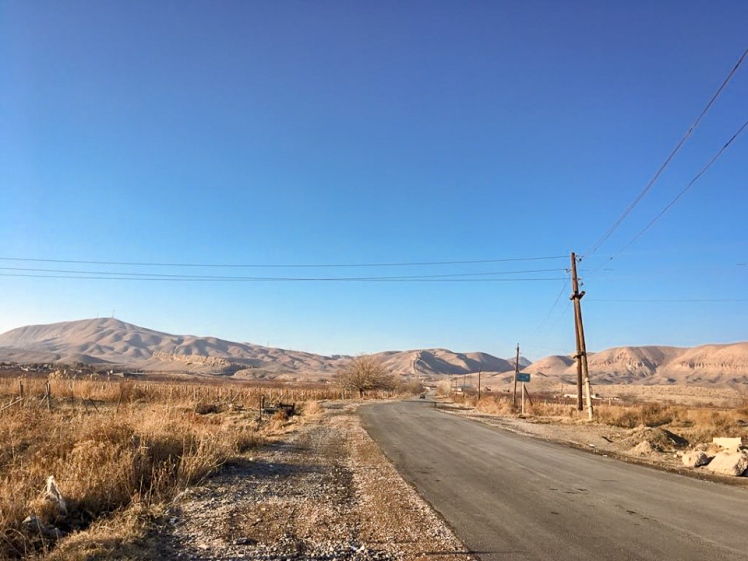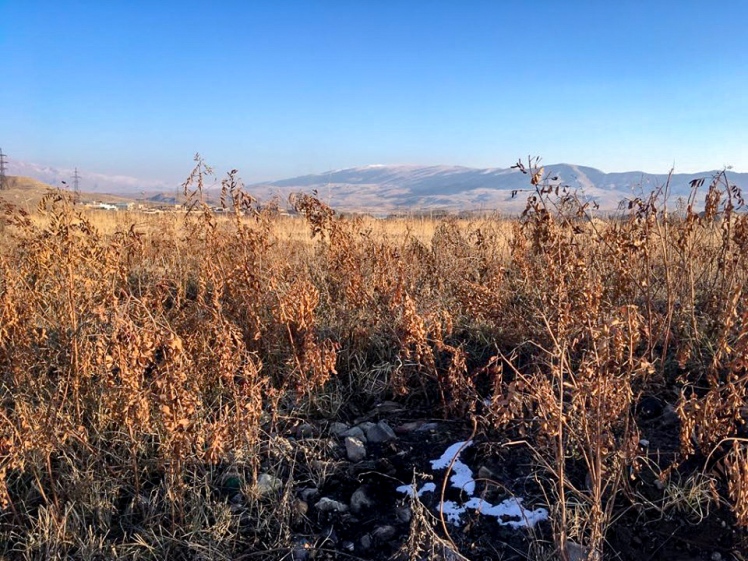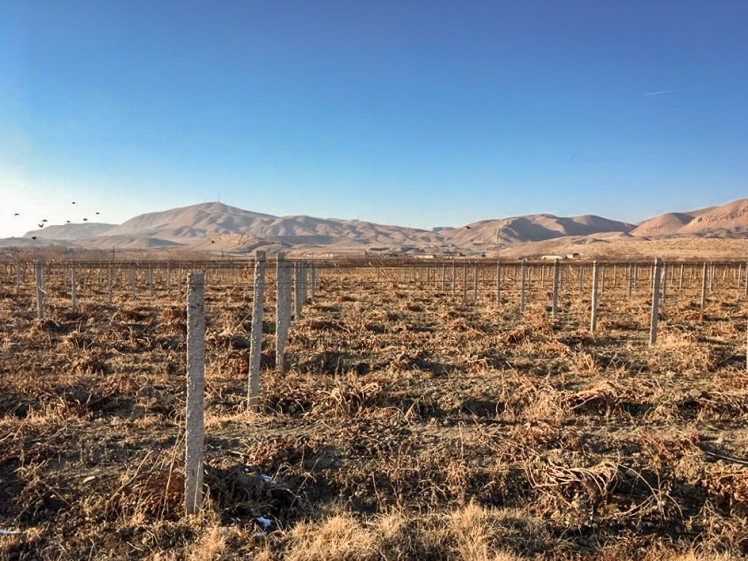They warn you about the Winter. How it’s not the cold itself, it’s that you can’t get away from it. It gets dark so early, and the winter food is different, and you have been here just long enough that it’s starting to feel long.
All Januaries are long, of course. It’s a long cold month, and you’ve somehow still got all of February after, and April and thaw sound like a promise you can’t quite believe. And Peace Corps Armenia is noted for brutal winters.
Still, my feet are cold. Inside, I wear four layers.
In the summer, the fat green fig leaves outside my window lit up like honey when the sun set, and I’d fall asleep to the babble of birds. Now, the tree is skeleton bare. Instead I have the distinct outline of Mount Ararat—the pretty small cone, and the unmistakable curve of Masis, dusty purple in the sunset. I’ll sit by the window, curled up next to the heater and watch cats slip under the wire fence and chase chickens. I’ll pretend to read for a bit. I’ll stay until I can see the first planet start to shimmer. Then it’s usually time for dinner.
In the mornings, I make a big cup of Armenian coffee (սուրճ/soortj) and smear butter and apricot jam on bread. I sit so I can see a sliver of the mountain through the condensation on the window. On clear mornings, of which there have been a lot, you can see every ձոր/dzor and canyon, where every river runs, even all the way across the border in Turkey. Early sun lights up the snow on the mountain pink and turquoise, and more colors, ones I don’t have names for. Steam curls off my coffee. I burn my lip every morning; I am always a little hurried. The soortj is always more bitter than I meant to make it. My host mom does it better.
When it snowed here, my 5thform begged me to let them ditch class so they could play “snowballs” outside before my Counterpart got in—“if you say yes she can’t say no later!” they reasoned. Flawed reasoning really, because I would absolutely get in trouble too. I said no.
That did not stop an in school snowball fight, which I found super չար and not at all չարming. Later, one of the male teachers whipped out a drill and nailed the windows shut so the kids couldn’t scoop snow in off the roof and trees. That I did find funny, especially since the teacher doing the nailing of the windows just made, like, really meaningful eye contact with the 6thform boys the whole time. Bummer guys. No more surprise snowballs after you “go to the bathroom”.

“Sorry Miss Med,” Lili* comes up to me while I shove my posters into my bag and try to breathe deep.
“It’s fine,” I say in English.
My seven girls still in club are watching me carefully and I wonder how obvious it is that I’m trying not to cry.
“Are you going back to America now?” she asks me, in Armenian.
Elen* and Maria* duck out of the classroom. They know they’re in trouble for real this time. I had spent an hour planning for this stupid lesson, and making the stupid cut outs, and they’d ignored me telling them not to yell three times. I had threatened to go home if they kept talking while I was talking, and now I was making good on it. Usually, it isn’t so bad. But three of my earlier classes had went poorly, one of the 6thgrade boys had made a really rude gesture at me, and now I was on the verge of tears in front of some of my favorite students.
Mostly, I was frustrated with myself for not having more patience. Also, I was feeling a little fat.
I swallow. “Voch te Amerika ayl toon.” Not to America, but I am going home.
“Khee?” Why?
Elen and Maria stand in front of the door, blocking my way out.
“Dook indz chek lisel,” I said, exasperated, making direct eye contact with Maria, who had jumped over a desk and crashed into a third grader. You guys to me didn’t listen. Deep breath, again.“Hima, im gloogkhs tsavoom e oo haves choonem. Vagha kpordzenk noritz.” Now, my head hurts and I don’t want to. Tomorrow we’ll try again.
(Haves choonem/ հավես չունեմ is hard to translate. It’s kind of like saying “I don’t have it in me”. Literally, it’s “I don’t have հավես”, but I don’t really know how to translate հավես accurately. Like “I’m not in the mood”, maybe?)
“Do you… want a hug?” Lili offers.
Obvious, then, I think to myself. I accept.
Another student makes Elen and Maria move for me. Which is good, because that’s an argument I don’t have in me, haves choonem.
Outside the school it’s bright. It snowed a few days before, and it’s mostly melted save a few patches in the shadows and puddles of ice in the road. I suck in cold air just fast enough that it hurts my lungs.
“Will there be club tomorrow?” Lili hesitates outside the school. You can see the mountain from outside the school too. It’s assuming and impossible to miss, bright whites and deep indigo gashes.
“Yeah, ka,” I answer.
I don’t cry until I finally get home and by then I’m not even really sure why anymore, or what the point of waiting for the privacy was if I’m just going to blurt it all over the internet anyway. But I cry either way, and then make a list of meaningful things from that day, and a list of things I am looking forward to for the next day, and then a cup of tea.
For me, I think the hardest part of mental health and self-care, especially here in Peace Corps Armenia but also everywhere, has been realizing it’s always going to be there. I need to be proactive every single day about how I am feeling, and even then, even when I get up at the right time, and go for runs, and take my vitamins, and do all the things that I am supposed to do, tick off all my little neurotic to-do boxes, I am still going to feel really terrible sometimes. And that kind of sucks.
I think that’s just part of life for me, and for most people, and I am increasingly okay with that. I’ve got a great people supporting me, and a handful of coping mechanisms that seem to work. I’m still excited to be here, and challenges still feel like challenges, not failures.
And now, my mid-day mental break down over one (1) bad club day seems kinda funny and dramatic. But I do love theatrics.
Also, it helps knowing that Tuesdays are just always awful. No one is having a good time on a Tuesday.

This is the part where the story gets better. We love a good narrative arc.
So I finished up crying, and self-medicated with an Earl Grey (reminds me of home). I talked on the phone with a friend and watched the sunset out my window. I sat down with my host mom for dinner, and we both lamented the state of the sixth grade—she teaches Russian at the same school as I teach English.
“If I say true,” I confess, shoveling a spoonful of bean soup in my mouth. “I am afraid from them.” I am a little bit joking.
“Me too!” She laughs, then frowns and shakes her head. “This wouldn’t have happened back in Soviet times,” she tells me. My host mom is just old enough to remember well what living in the Soviet Union was like in Armenia. “Students listened better then. I would’ve never acted like some of these kids. It just, would never have happened.”
“But what difference is there?” I ask.
“Aysink’n?” Meaning?
“Between Soviet time, and now?” I clarify.
She nods, and explains. “In Soviet times, people had better jobs, more money. I remember people would just all leave their keys under the doormats. Are you understanding?”
“I think yes. What is “doormat”?” I ask.
“The thing in front of the door, on the ground, where you clean your shoes.”
Writing this I don’t remember the Armenian word for doormat she told me. Sometimes it’s honestly in one ear and out the other.
“Ah, haskatsa.”
She goes on to explain that when the Soviet Union fell, things changed. It was harder to find work. Some of the nuts and bolts of her explanation of the fall of the Soviet Union in Armenia I didn’t fully understand, or I think understand, but not well enough to feel confident sharing.
“And now?” I ask when she finishes.
“Now? Now I am hopeful, with our new president, but this sort of thing takes time.”
“kamants kamants,” I say.
She smiles. “Ayo, kamants kamants.”

I have two Counterparts, which is a relatively unique situation among TEFL volunteers, but not unheard of. It’s worked out really well for me, because both of them are great to work with for different reasons, and it’s given me a really good chance to learn more about teaching English from two established teachers, each with a different style of teaching. It was a little hard at first to figure out how my role in the classroom differed working with each of them and how it would be the same, but now I’m grateful for the variety.
One of my Counterparts has two delightful daughters, Ani* and Gohar*. I missed Nor Tari, the several day Armenian New Year celebration when I was in Germany, so my Counterpart and her family had me over for a late celebration.
“Miss Meddi nay!!” Ani pulled my attention away from her aunt so I could watch her and her little sister’s full dance routine to every Armenian pop song ever. I grinned—my sister and I used to do that too when we were little, dance in front of the TV and make our family watch.
Ani taught me some Armenian words, and I taught her some English ones, and we took some silly selfies on her phone.
Ani showed me her little sister’s art while her sister watched, shy, from the corner.
“That’s beautiful,” I said, making sure Gohar could hear. “Is that a queen?”
“Queen… nshanakoom e… tagoohi?” Ani asked.
“Uh-huh,” I said.
Ani grinned. “Doo… queen es.”
I laughed, and blushed. “You too, Ani”.
*All names are pseudonyms, but the stories, especially the embarrassing parts, are real
(All views expressed on this site are my own and do not reflect the views of the Peace Corps, the US government or the Armenian government!)
Wonderful piece this week. I admire what you all do there very much.
LikeLiked by 1 person
Thank you very much! Stay warm!
LikeLike
Dear Maddie,
I just read your last three pieces. You write so well I feel like I’m right there with you. Your last one reminded me of back when your mom and Aunt Annie were the ages of your girls and they did the same dancing and all of us were their audience. Those were the fun good ole days. Your mom and Annie were always so much fun.
May God bless you and keep you safe. Can’t wait for your return.
Love,
Aunt Kay
LikeLiked by 1 person
Hi Aunt Kay,
Thank you! That sounds so sweet, I can imagine it! Claire and I used to do that too I think, there’s some funny pictures of us with those horrible bangs doing a gymnastics act or something?
Love,
Maddy
LikeLike
The story of winter tribulations are great. Thank you for sharing
LikeLiked by 1 person
Thank you for reading!
LikeLike